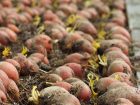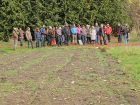
Features
Production
Profiles
Creating seed sustainability
A number of B.C.-based organizations are working together to develop shared resources for new entrants, small seed businesses and existing ventures.
March 4, 2019 By Ronda Payne
 Shauna MacKinnon is a program co-ordinator with FarmFolk CityFolk.
Shauna MacKinnon is a program co-ordinator with FarmFolk CityFolk. Canada currently imports millions of dollars’ worth of seed every year, despite mild winters in the southwest of B.C. that position the province as a viable climate for seed production.
“Seed is mainly imported in B.C.,” explains Shauna MacKinnon, program co-ordinator with FarmFolk CityFolk, a not-for-profit organization that is leading a provincial project that is aimed at increasing seed production capacity and customer base for seed farmers. “We’re quite dependent on imported seed for farmers. We’ve been working with the B.C. Seed Initiative [the Bauta Family Initiative on Canadian Seed Security (BFICSS)] for over 10 years. It’s our third year of B.C. seed trials with the University of British Columbia (UBC) Farm. And, we also work with about 25 other farms across B.C. We have an opportunity here.”
There are currently 15 operating seed companies within the province of B.C., including co-operatives. There are also a number to community seed initiatives, including 20 seed libraries, and a number of post-secondary institutions that are active in seed trails and processing.
Together, the BFICSS, FarmFolk CityFolk, the B.C. Eco Seed Co-op, and UBC Farm are working with 75 different seed strains of 15 different vegetables, including spinach, beets and kale.
Government support
In October, both the provincial and federal governments demonstrated their support for the growth of a B.C. seed industry with $100,000 in funding for FarmFolk CityFolk through the Canadian Ag Partnership.
With the help of the government funding, FarmFolk CityFolk will continue to develop shared resources for both new entrants and small seed business as well as aiding existing seed ventures to expand their seed production skills through training opportunities.
The funding will also allow for the development of a mobile seed-processing unit to help small- and mid-scale seed farmers efficiently and affordably process seed.
“The mobile seed unit is a unique shared infrastructure project which arose from the seed-grower feedback that without proper equipment, it was hard to scale up production,” said Chris Thoreau, B.C. seed security program co-ordinator with FarmFolk CityFolk in a news release. “The mobile unit will provide seed growers with several seed-cleaning tools to help them scale up production and processing capacity. If proven effective, the unit can act as a model for permanent seed-cleaning facilities at strategic sites across B.C. Further, the unit will be an effective outreach tool at agricultural events and conferences around B.C.”
Mel Sylvestre, UBC farm seed hub co-ordinator and B.C. Eco Seed Co-op member, adds that as a small-scale seed producer, who also grows fresh market crops, having access to a mobile seed-processing unit will help increase production capacity.
“Many of the pieces of equipment needed to clean seeds efficiently are too expensive or hard to secure at our scale. The mobile seed-processing unit will allow us to grow larger quantities of seed crops without having to upgrade our current processing setup,” Sylvestre says. “Seed production is an emerging sector in B.C. and we still have so much to learn in order to develop the right techniques and processes adapted to our regions and scales. For that reason, I am looking forward to the educational opportunity offered through this program.”
Finding a market
For many contemplating producing seed, one of the first questions isn’t how to do it, but how to sell seed and who to sell it to.
“We are doing market research on the market for seed in B.C. today,” MacKinnon notes. “Seedy Saturday and Sunday events are one source for sales, with many events listed online. This year, there are about 50 of these events across B.C.”
The second route to market is to join and sell seed through the B.C. Eco Seed Co-op, which can be accessed online.
“The third market is growing seed for other seed companies,” MacKinnon says. “If you’re just starting out, there are a lot of smaller seed companies looking for people to grow seeds for them. It’s a great opportunity for certified organic growers to grow seed for some of these companies.”
Together with UBC Farm, FarmFolk CityFolk has created a seed production enterprise budget template. This is presented to potential growers through workshops. These course offerings also include sample contracts, cases studies and export procedures for those who want to take their business into other countries. Additionally, when it comes to production and getting help, MacKinnon notes that the Organic Seed Alliance is a great resource for production guides.
There are other aspects to having a successful, thriving seed production business beyond who to sell to and understanding production estimates.
“If you’re getting into growing seed, quality assurance and best practices are essential,” MacKinnon notes. “You might be able to do these germination tests at home or you may have to send them to a lab.”
The testing that needs to be done for selling seed includes: Isolation distances and population sizes, germination testing and purity, vigor and disease testing.
She adds that while there isn’t a lot of information publicly available on quality assurance and best practices right now, the website (bcseeds.org) does offer some.
“We’ve been interviewing seed companies to get that information,” she says.
She suggests contacting those in the seed growing market and ask what some of the gaps are within the market that could be taken advantage of.
“A lot of Canadian seed markets just can’t grow the seeds they need,” she notes of the B.C. climate advantage. “Approach companies in your region and grow with them. Maybe start with one seed crop initially, then see what else that company may need.
MacKinnon has been instrumental in helping to host the B.C. Seed Gathering, which was held over two days in November 2017 in Richmond. The event is heavy on interaction and networking, but also provides information and the opportunity for producers to provide input on the current state and issues in the sector. The event is suitable for both existing and potential producers and focuses on bringing together seed producers and experts from across the country, on a biannual basis.
According to MacKinnon, there is still plenty of work to be done in the domestic seed industry. Efficacy of seed must be proven in order to attract consistent, long-term buyers and producers must find markets for their seeds to stay viable. But, by working together, taking advantage of available information and focusing on the seeds needed by the market, there are a lot of positives on the horizon for seed growers across Canada.
Seed production resources
Shauna MacKinnon program co-ordinator with FarmFolk CityFolk points to these production resources for both beginners and those already in the industry.
Online vegetable seed courses – cog.ca
Organic seed production guides and webinars – seedalliance.org
Field days, workshops, variety trails and plant breeding training – bcseeds.org
Seedy Saturday events – seeds.ca/events
B.C. Eco Seed Co-op – bcecoseedcoop.com
Seed company listings – seeds.ca/diversity/seed-catalogue-index
Budget templates – bcseeds.org/cog-seed-production-course/
Market information – pickacarrot.com
FarmCity FolkCity – farmfolkcityfolk.ca
Print this page


